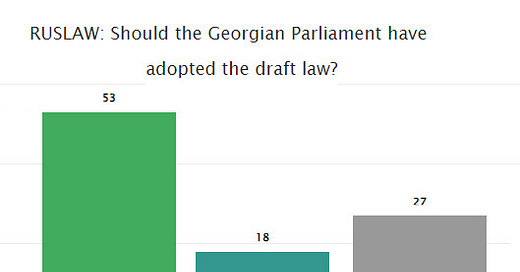The Majority of Georgians Reject the Draft Law on "Transparency of Foreign Influence"
The Georgian Dream has set itself on a destructive (and self-destructive) course.
The majority of Georgians appear to be against the draft law on "transparency of foreign influence", according to a CRRC survey from March 2023. Back then, more than half say the government should not have adopted the law. Only 18% follow the Georgian Dream government’s policy in saying that the law should have been adopted. About a quarter of the population say that they don't know what to make of it.
Given that the government in March 2023 made all efforts to convince the population, through all of the many resources it has at its disposal, it clearly did not manage to make a convincing argument. In fact, less than half of those who said that they might vote for the Georgian Dream supported the law. More than a quarter of Georgian Dream voters were explicitly against the law, with nearly a third saying they did not know.
The question wording was fairly balanced, phrased as "On March 7 the Georgian Parliament passed a draft law 'On Transparency of Foreign influence' in the first hearing, occasionally referred to as the 'Russian law' However, the Parliament voted down the draft In its second reading in your opinion, should the Georgian Parliament have adopted the draft law?"
While the ruling party may dislike that wording, the law indeed is popular among those who disapprove of the Georgian government's stated aim to join Europe. Of those who dislike Georgia's westward course, 55% felt that the law should be adopted. (Even here, more than a quarter disliked the law.)
The law was most popular among the watchers of Obiektivi TV (48%), PosTV (44%) and Imedi (33%). Obiektivi and PosTV are associated with far-right parties. The law was least popular with those who most trust Adjara TV (law rejected by 100%), Formula (also 100%), Mtavari Archi (76%). Note that these figures have a higher margin of error, as the crosstabs may refer to small subsections of the sample.
The law is not popular among the young. Two thirds of those under 34 reject the law, as compared to 42% of those above 55 years. Yet even for that older cohort, only 22% thought that the law should have been adopted. Slightly more men were in favour of the law (22%) as opposed to women (15%). This may also align with the suggestion by some observers that the Georgian Dream tries to run on an agenda of machismo.
Given the polling, which is publicly available at CRRC’s Caucasus Barometer web interface, it seems fair to say that the draft law on "transparency of foreign influence" does not look like an electoral ploy. It looks like a step of a government that wants to eliminate its opposition, rather than compete with it.
This will, however, be a tall order. If two thirds of people under 35 dislike this turn away from Europe, the government is not on a course that can easily be sustained. Transferring Russian-style laws to Georgia only works if you have the kind of support that Vladimir Putin, in the end, still commands. The Georgian Dream government engages in repressive politics without having credible resources for this strategy at their disposal.
The upcoming contest is likely to be bitter, perhaps all the more so because the Georgian Dream government must know that time, in the end, is not on their side.
How the Georgian Dream government plans to survive the 2025 municipal election in Tbilisi, a place where elections are more free and fair than elsewhere in Georgia, is anyone’s guess.
(More to follow on the law’s many deficiencies. Some thoughts already in this Twitter thread.)





